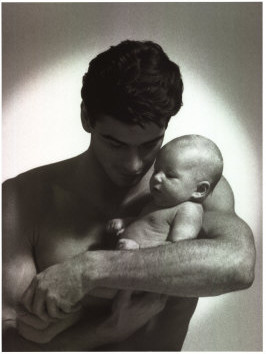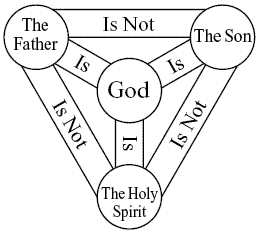Some clarifications: a reply to McManus – Part 1
What does “monarchical trinitarianism” include exactly?
What does “monarchical trinitarianism” include exactly?
How can they respond to an argument which shows that they collapse the Father/Son distinction?
A podcast listener recently emailed me to ask (emphases added): I won’t hide that I’m a happy Trinitarian and yet that I’m thoroughly enjoying your podcast since it provokes my theology and forces me to actually think about why I believe what I believe. This is a healthy check I think. I am puzzled though about why the numerical issue is so important. If Jesus… Read More »reader question on the Trinity and numerical sameness
A prolific apologist embraces so-called “monarchical trinitarianism,” on which the one God just is the Father, not the Trinity.
“The Trinity doctrine, at least for orthodox Christians, is found in the seven ecumenical councils.”
This time, another great Christian thinker, who I discovered some time around 1998.

Last Christmas season I posted in a slightly Grinch-like way about catholic Incarnation theories, and about some Christians’ lack of critical thinking about them.
There’s an interesting human impulse observable here. The best analogy I can think of right now is posters like the one to the left. The ladies love them.
Why? There’s the sex appeal of the dude. And the cute baby. Everyone likes a cute baby.
But there’s something else, something affecting about a big, strong, tough manly man, stooping to gently cradle a teeny, vulnerable baby. He’s made himself so vulnerable. Of course, that adds to the “sexy” part. My point is, the affecting nature of the man’s condescension is a distinct element of the appeal.
Now imagine that God, big strong God, becomes an ignorant, weak, dependent little baby. There’s a similar, recognizable emotional tug there. What an amazing idea! Of course, it may be amazing in part because it’s contradictory. But I’ll not argue that here.
Instead, a bit of cross-cultural comparison. Christians aren’t the only ones who go in for the idea of a god who comes down from his mighty position, to be a cute, puny little baby.
The Ramayana is an epic poem, and a sort of scripture in Hinduism. Parts of it go back perhaps to the 400s BCE, though it comes in many versions, some of which are from the high middle ages. The clip below is from a wildly popular Indian television series from 1986 called Ramayan. If you’re interested in Hinduism, I recommend it, but it’s a real time commitment to watch the whole thing. I’ve edited some bits of it, to include the more theological parts, and to get it down to youtube length. It’s here, Ram or Rama, is supposed to be an avatar of the god Vishnu.
My point is notRead More »God the baby – Rama / Ram, avatar of Vishnu
A while back I posted on a short, popular piece by Biola theologian Fred Sanders. He’s now responded. I’m going to continue the conversation, I hope shedding light on the differing assumptions and methods of present-day academic theologians and philosophers. I agree with Fred that responses-to-responses are usually boring. Here’s a greater crime: a (long) response to a response to a response. 😛
I guess what set me in motion was his claim, which struck me as unreasonable, that it’s a good thing that there’s no “Trinity verse” in the Bible – i.e. one which explicitly and clearly states the doctrine.
In fact, up until I think some time in the late 19th c., trinitarians thought they had something pretty close:Read More »Cross-Cultural Dialogue: Theologian and Philosopher
This is a guest post by Mr. Mario Stratta, a frequent commenter on this blog. He works in electronic engineering in Italy, and blogs on theological topics as “Miguel de Servet” at beliefnet. – Dale In the OT we find an obscure reference to the “eternal arms” of God: “The everlasting God is a refuge, and underneath [you] are [his] eternal arms …” (Deut 33:27)… Read More »Word and Spirit: the “Everlasting Arms” of God
I take it the purpose of the debate is whether or not “the” doctrine of the Trinity is derivable from the Bible. What is this doctrine, exactly? The burden falls on Bowman to be clear about just what doctrine is in view; he’s making the positive case. Here’s what he says: 1. There is one (true, living) God, identified as the Creator. 2. This one… Read More »SCORING THE BURKE – BOWMAN DEBATE – Bowman 1
Is my definition of the concept unitarian so wide that it would allow in some famous trinitarians?
I recently read this somewhat disturbing post by our friend Fr. Aiden Kimel. Though he lightens things up with humor a couple of times, it is a pretty thorough condemnation of analytic theologians. A charge he makes by implication against analytic theologians (i.e. those trained in analytic philosophy who work on topics in Christian theology) is that like the “Arians” of old, we suffer from… Read More »against despising analytic theologians
It seems I touched a nerve, judging by the word count so far (here, and here). First, let me make clear that I have no interest in mocking Catholic doctrine. I’m a non-catholic (and so non-Catholic) Christian, and am in sympathy with the Catholic tradition in many ways. I’m going to avoid some well-worn Catholic-Protestant battle areas here, and try to stick to what I… Read More »More on Loyola’s “white is black” passage
What sort of being is “God” supposed to be? Your answer to this will constrain your options when it comes to thinking about the Trinity. The “Trinity” (in the primary sense of the term) is supposed to be none other than the triune God, the tripersonal God of officially catholic traditions since the late 4th century. In other words, the Trinity and God are supposed… Read More »10 steps towards getting less confused about the Trinity – #2 Get clear about “God”
 In round 5, Bowman aims to show that the “threefoldness” of God is implied by the Bible. At issue is how to explain “triadic” mentions of Father, Son, and Spirit (Or God, Jesus, the Holy Spirit, etc.). Bowman mentions his list of fifty such passages. Here he focuses on a dozen passages. But first, his recap of where he thinks the debate is so far:
In round 5, Bowman aims to show that the “threefoldness” of God is implied by the Bible. At issue is how to explain “triadic” mentions of Father, Son, and Spirit (Or God, Jesus, the Holy Spirit, etc.). Bowman mentions his list of fifty such passages. Here he focuses on a dozen passages. But first, his recap of where he thinks the debate is so far:
In the preceding three rounds of this debate, I have argued that the person of Jesus Christ existed as God prior to the creation of the world and that the Holy Spirit is also a divine person. If my argument up to this point has been successful, I have thoroughly refuted the Biblical Unitarian position and established two key elements of the doctrine of the Trinity. Add to these two points the premises that there is only one God who existed before creation and that the Father is not the Son, the Son is not the Holy Spirit, and the Father is not the Holy Spirit, and the only theological position in the marketplace of ideas that is left is the doctrine of the Trinity. Since these are all premises that Biblical Unitarianism accepts, I have not defended them here. (emphases added)
I’m tired of pointing out the inconsistency of what Bowman is urging. I’m capable of hearing the many ways theorists smooth away apparent inconsistencies (making subtle distinctions), but other than a quick gesture (I think in Round 1), I hear none of these familiar notes from him. This is just to say – he’s a resolute positive mysterian. Briefly, Father, Son and Spirit are numerically three, as they qualitatively differ from one another. But also, Bowman seems to think, each of them is numerically the same as God. This is inconsistent, because the “is” of numerical sameness is transitive – if f = g, and g = s, then f = s (compare: the concept of “bigger than”). Also, it seems that he thinks Father and Son to the same god, and also, since this god just is a person (hence “who” above), they are the same person as each other. And, of course, also they are not. Sigh. Let’s stick with the vague “threefoldness” claim I started with.
Bowman ignores what I call Read More »SCORING THE BURKE – BOWMAN DEBATE – ROUND 5 – BOWMAN – PART 1
Our friend Dr. Ed Feser has got himself worked up into full drunken polemicist mode. I earn ridicule and ire normally reserved for Dawkins types. Evidently I touched a nerve by pointing out that most (analytic) philosophers now – reflecting a fairly wide consensus since early modern times – think of God as the greatest being there is or could be, and not as “Being… Read More »why I’m not a Thomist 1 – the Christian tradition that God is a Being
Sincere advice on how to move past a merely verbal defense of “the Trinity.”